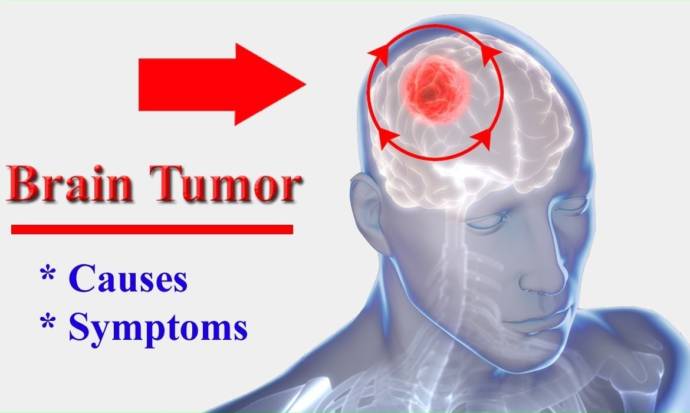A brain tumor is a condition in which cells divide in an uncontrolled manner in the brain leading to a mass of cells. Various types of tumor exist in the brain, some are cancerous while other are non-cancerous. Symptoms of a brain tumor include a headache, vision problems, confusion, disorientation, difficulty breathing, swallowing and speaking, and the patient may also experience diarrhea and constipation. Diagnosis is done though neurological evaluation and imaging techniques.
Types
- Acoustic neuroma: This type of brain tumor arises from the seating protected the nerve which leads from the inner ear to the brain. It is a low-grade benign tumor. It occurs on the eighth cranial nerve and is also known as schwannoma.
- CNS Lymphoma: Cancer in the lymphatic system invades the brain and spinal cord and causes lymphoma. Cancer involves the uncontrolled division of lymphocytes.
- Meningioma: Brain is surrounded by the three membranes providing protection. The tumor developed from these membranes is known as meningioma. It is a slow-growing tumor and has little potential to spread thus known to be non-cancerous.
- Metastatic brain tumors: Tumors originated in other organs and then spread to the brain are termed as a metastatic brain tumor. The tumor with high metastatic risk is tumors of lungs and colon.
- Medulloblastoma: It is the most common tumor present in childhood. Most commonly found in the cerebellum, these tumors have the capacity to spread through cerebrospinal fluid.
- Pituitary tumors: Two types of pituitary tumor exist. A pituitary adenoma is the commonly found non-cancerous form while pituitary carcinoma is a malignant form and is rarely found.
Causes
There are two types of genes present in the cell. One is the oncogene and the other is tumor suppressive gene. Tumor suppressive gene regulates the division of the cells and is more dominating than oncogene. Due to unknown reasons, either the tumor suppressive gene becomes less active or the oncogene becomes more dominating, the division of cells becomes uncontrolled. Following are the major source of cancer in the brain:
- Abnormal cell growth: There is an abnormal cell growth within the brain in the brain tissues. The tumors which are originated due to the brain tissues are termed as primary brain tumors. These tumors may either be benign or malignant. The site of these tumors may be meninges, pituitary gland, or on the nerves. These are less commonly found in adults as compared to metastatic tumor.
- Metastatic tumor: These types of tumor originated primarily in another part of the body and spread to the brain. Such tumor is known as metastatic tumor and these are a malignant or cancerous tumor. Cancer that may metastasize to brain includes lung cancer, colon cancer, kidney cancer, breast cancer, and melanoma.
Symptoms
- Moderate to a severe headache.
- Vision problems such as blurred vision or double vision.
- Difficulty swallowing.
- Difficulty breathing.
- Difficult in speech and thinking.
- Confusion.
- Balancing and coordination problems.
- Reduced memory.
- Cognitive decline.
- Numbness or weakness in muscles.
- Seizures.
- Feeling of nausea and vomiting.
- Restlessness
How to diagnose
Various methods are adopted by the physicians, surgeons or oncologists to diagnose a brain tumor.
- Physical examination: Neurological or physical examination of the patient is conducted, and the evaluation is done through vision, hearing, coordination, balancing, and reflexes.
- Imaging techniques: Various imaging techniques are used to diagnose the tumor, its size and location. MRI is conducted to identify the exact position of the tumor so as to plan surgery. CT scan is conducted to evaluate the size of the tumor and other surrounding tissues involved. Other imaging techniques include a PET scan, myelogram, and cerebral angiogram.
- Cancer in other organs: While diagnosing the tumor in the brain, the oncologists also evaluates whether the tumor originates from the brain or has been metastasized from another organ.
- Cognitive assessment: Cognitive assessment of the patient is done to evaluate the functioning of the brain.
- Electroencephalogram: This test is done to evaluate the electrical conductivity in the brain.
- Nerve conductivity: The potential in the nerves is also analyzed to identify any abnormality in nerve conduction.
Risk neglecting Brain tumor
- Prolonged fatigue: As the tumor increases, the body needs the energy to fight against the tumor. Further, energy is also required for rapid tumor growth.
- Headache: A Persistent headache is experienced by the patient. The severity increases as the tumor increases in size.
- Nausea and vomiting: As the tumor start affecting the nerves responsible for balance and coordination, the patient experiences nausea and vomiting.
- Difficulty swallowing: The tumor may affect the muscles responsible for swallowing.
- Respiratory depression: If the tumor affects the respiratory center, it may lead to difficulty breathing and respiratory depression.
- Death: In case the tumor affects the nerves, which innervates the vital organs, the death of patient may occur.
Stages
Brain tumors are assigned grades according to severity.
- Grade 1 tumor is slow growing and does not cause symptoms. They are generally non-cancerous.
- Grade 2 tumor is cancerous and slow growing and looks abnormal when viewed under the microscope.
- Grade 3 tumor grows fast and can spread to other parts of the brain. These tumors interfere with normal brain functions.
- Grade 4 tumor has dead cells and may have their own blood vessels.
Foods
- Spinach
- Carrot
- Fatty fish
- Fresh fruits
- Potatoes
- Citrus fruits
- Multigrain bread
- Olive oil and flaxseed oil
- Turmeric and mint
- Beans
- Quinoa
- Dairy products
Prevention tips
- Maintain a healthy diet.
- Reduce depression, anxiety, and stress through meditation and yoga.
- Avoid eating tobacco and smoking.
- Keep yourself away from direct sunlight.
- Keep yourself vaccinated for pathogens having a high risk of developing tumors such as Hepatitis and Human Papillomavirus.
- Consult your physician for any neurological symptom.
When to see a doctor
Call your doctor if:
- You have moderate to a severe headache.
- You have any vision change.
- You fell numbness in any organ.
- You feel difficulty in swallowing, speaking or breathing.





